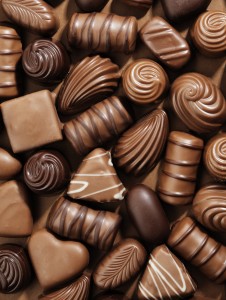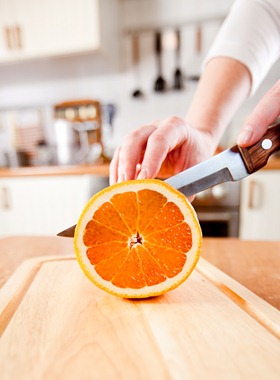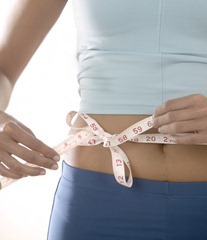 Scientists think that an environment which encourages you to eat unhealthy food is a major reason for the increase in obesity. There’s even a name for the phenomenon: The Obesogenic Environment. We are surrounded by unhealthy food choices. Think how easy it is to get hold of junk food – you’re never more than a few paces away from a Mars bar, a bottle of Coke or a packet of sweets – the very “danger” foods that cause us to put on weight. Junk food is sold to us in every imaginable setting: at work, in leisure centres, on every high street, in vending machines, petrol stations and newsagents. When our environment promotes unhealthy food, is it any wonder that we are putting on weight? It’s not all doom and gloom – there are a number of ways that you can change your environment so that it works for you, rather than against you. The following tips should help.
Scientists think that an environment which encourages you to eat unhealthy food is a major reason for the increase in obesity. There’s even a name for the phenomenon: The Obesogenic Environment. We are surrounded by unhealthy food choices. Think how easy it is to get hold of junk food – you’re never more than a few paces away from a Mars bar, a bottle of Coke or a packet of sweets – the very “danger” foods that cause us to put on weight. Junk food is sold to us in every imaginable setting: at work, in leisure centres, on every high street, in vending machines, petrol stations and newsagents. When our environment promotes unhealthy food, is it any wonder that we are putting on weight? It’s not all doom and gloom – there are a number of ways that you can change your environment so that it works for you, rather than against you. The following tips should help.
Portion Size
Plate sizes have been getting bigger, and most of us are culturally programmed to finish what’s on the plate – a recipe for overeating! Research shows that when you put larger portions in front of people, people eat more – and don’t even realise they’re doing it. My favourite experiment involved a never ending soup bowl (fresh soup was piped in from below) which caused people to eat way more soup. Other experiments involved giving people popcorn in different size containers: People ate 45 percent more popcorn from extra-large containers compared with large ones. In light of this research, it’s worrying to think that the average size of dinner plates has increased in the last few decades. The solution? Buy smaller plates! I’m not joking, simply using smaller plates will help you to control your portion size. Instead of having to think about every mouthful, you make one simple change to your plate size and you will be less inclined to overeat. If you clear your plate and you are really still hungry, you can always go back for more – but you’ll have to consciously decide to get more, rather than mindlessly ploughing your way through a heap of food on an extra large dinner plate. Research also shows that people tend to drink more from short fat glasses compared with tall thin ones – so if you do drink fizzy drinks (which I DO NOT recommend), using tall thin glasses will help limit your consumption.
Make the Healthy Food Choice Easy
 Don’t make the mistake of surrounding yourself with junk food – you’ll be far more likely to succumb to temptation. Shopping is a key time when you really need to think about controlling your environment. If you don’t buy crisps, sweets and fizzy drinks, you’ll be less likely to consume them. Making one good decision when you’re shopping will save you from having to constantly resist temptation. Make a shopping list and stick to it. Don’t shop when you are hungry – you’ll be more likely to buy junk. Get yourself fired up and positive when you shop for food and stick to healthy options. This will pay dividends when your resolve falters later on – when you crave junk food, there won’t be any in the cupboard.
Don’t make the mistake of surrounding yourself with junk food – you’ll be far more likely to succumb to temptation. Shopping is a key time when you really need to think about controlling your environment. If you don’t buy crisps, sweets and fizzy drinks, you’ll be less likely to consume them. Making one good decision when you’re shopping will save you from having to constantly resist temptation. Make a shopping list and stick to it. Don’t shop when you are hungry – you’ll be more likely to buy junk. Get yourself fired up and positive when you shop for food and stick to healthy options. This will pay dividends when your resolve falters later on – when you crave junk food, there won’t be any in the cupboard.
Pre-Commit to Eat Healthy
Stock your house with plenty of healthy foodstuffs like fruit, vegetables, wholegrain products, nuts and seeds. Make sure these foods are easily available. Commit in advance to eating well:
- Put 5-10 pieces of fruit in a bowl in the morning, and make sure you eat them by evening
- Put fruit and nuts into a lunchbox for a snack during work-time
- Leave a jug or bottle of flavoured water on your desk – you’ll be less likely to go for unhealthy fizzy drinks
- Leave a well stocked fruit bowl where the family can easily get to it – you’ll be more likely to snack on fruit
The TV Environment
Don’t have a TV in the room where you eat, or make sure that you religiously turn off the TV whilst eating. Research shows that watching TV whilst eating has been linked to overeating and obesity. Having a TV in your bedroom is also a bad idea. It will affect your sleep patterns, and poor sleep has been linked to obesity. Whatever you do, don’t allow your kids to have a TV in their room – this encourages passive habits and has been linked to obesity.
Pushing Junk Food
Our commercial world pushes junk food constantly (because it is so profitable). You can’t change this bit of your environment, but you can at least be prepared for it! Don’t believe the advertising slogans concocted by junk food manufacturers, and be ready when junk food is pushed at you. I recently bought a cup of coffee at a petrol station, and the shop assistant almost fell over when I refused the free muffin: “but it’s free!”. You don’t need the muffin. Don’t take it. Be prepared when shop assistants offer a free chocolate or a special offer on junk food – just say no. I recently stood in a massive queue at WHSmith in Heathrow Airport, trying to buy a bottle of water. The queue was so long because every time someone made a purchase, the shop assistant offered them three large chocolate bars (Toblerone) for the price of two. It was working – many people were buying chocolate that they had no intention of purchasing when they walked in the shop. Decide what you want to buy, and stick to it – ignore any offers, and beware of this marketing tactic.
Get Some Toys!
 Fill your house with active toys:
Fill your house with active toys:
- Footballs, tennis balls and frisbees are not just for kids
- If you have room, get an outside table tennis set or basketball hoop
- Get a table football and have tournaments with family & friends
If you have easy access to active toys, you’ll be more likely to get out and be active.
Move More
Park a bit further away from your destination than usual, and walk the rest of the way. Buy a bike and use it to run errands, commute, or just to go for a leisurely bike ride. Store it somewhere prominent, so that it will act as a reminder to you.
Control Your Leisure Environment
Instead of always meeting friends in a pub or restaurant, try tag rugby, 5-a-side football or go for a swim and a sauna together. When you take the kids out for a treat, decide in advance against taking them to McDonalds – take them for a walk or a swim instead. You don’t need junk food to bond with the kids, and if you don’t expose yourselves to fast food restaurants, you’ll eat less junk food. Get some activity and have some healthy snacks afterwards. If you do get some active leisure, watch out – most leisure centres boost their profits by vending junk food. Don’t undo all your good work by guzzling chocolate. Plan in advance how and where you can get a healthy meal after your activity session.
Summary
We can’t control all aspects of our obesogenic environment, but there are many ways that we can get our environment working for us:
- Control portion size – use smaller plates & taller glasses
- Make a shopping list and stick to it – don’t buy junk food
- Add 5 – 10 pieces of fruit to a bowl every day and make sure you eat them
- Keep a bottle of water available – you’ll be less likely to consume unhealthy drinks
- Stock up on active toys – for adults & kids!
- Get active in your leisure time – meet your mates in the gym rather than the pub
- Don’t eat in front of the TV
- Keep the TV out of bedrooms
- Be prepared when junk food is pushed at you
- Move more – walk and cycle when you can
You could also cause a fuss where you see unhealthy choices being promoted – why not try to change things for the better? I worked with secondary schools in our local County to have fizzy drinks vending removed and replaced with bottled water vending. Fizzy drink consumption plummeted overnight in the schools that made the change, simply because access was restricted. So get out there and make your environment more healthy!
Photo 1 by: Svadilfari licensed under Creative Commons Photo 2 by: emdot licensed under Creative Commons Photo 3 by: catface3 licensed under Creative Commons

